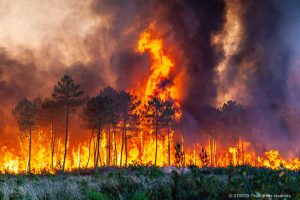
by Cynthia Petrigh | Nov 24, 2024 | Info, OurWork
 According to Arundhati Roy, « another world is not only possible, she is on her way. On a quiet day, I can hear her breathing. » Those who can’t hear her yet are forgiven, because there have not been many quiet days in the past couple years.
According to Arundhati Roy, « another world is not only possible, she is on her way. On a quiet day, I can hear her breathing. » Those who can’t hear her yet are forgiven, because there have not been many quiet days in the past couple years.
The invasion of Ukraine by Russia; the complicity of the US, the UK and to some extent the EU in the genocide taking place in Gaza; the contempt shown by a handful of countries including the US for the decisions of the International Criminal Court; the election of populist, extremist strongmen; the manipulation of globalised discourse; are all symptoms of the deep political, institutional and cultural polycrisis that has engulfed us. Since WWII, humanity’s collective project was to build peace, with a mixed result and many setbacks, but that was the collective objective, the reason d’être for the creation of the UN. Life expectancy, school enrolment, access to health, freedom of movement, kept increasing. Child mortality, violent deaths, illiteracy, kept decreasing, since 1945, globally. Until a few years ago, where this trend was reversed. We are witnessing the highest number of conflicts, a decrease in access to health, education and safety. The effects of climate change, with extreme weather conditions, storms, fires, rise of sea levels, have become unavoidable, causing destruction, displacement and generating new sources of conflict. A report from UN OCHA revealed that the year 2024 has become the deadliest on record for humanitarian personnel, with the recorded death of 281 aid workers globally, surpassing previous records.
According to the Global Peach Index (GPI 2024 Report), which measures the state of peacefulness based on data from 163 countries, 2023 has seen the highest number of countries to deteriorate in peacefulness in a single year since the inception of the index. There are currently 56 active conflicts, the most since the end of WWII, and 92 countries are engaged in a conflict beyond their borders. The report also notes that fewer conflicts are resolved, either militarily or through peace agreements: the number of conflicts that ended in the military victory a one side fell from 49 per cent in the 1970s to nine per cent in the 2010s, while conflicts that ended through peace agreements fell from 23 per cent to four per cent over the same period. « The combination of these factors means that the likelihood of another major conflict is higher than at any time since the inception of the GPI », concludes alarmingly the report.
Our world is broken.
And yet, we have one planet only, and we have no other option than learn to coexist and live in harmony, with each other and with the planet – or disappear as a species. In the face of such high levels of violence, mistrust, division and hatred, we need more active efforts to foster compassion, dialogue, understanding, and a renewed multilateralism. The human being has survived and thrived through cooperation, not through conflict or isolation.
According to the parable of the Long Spoons, one day God showed a human being the difference between heaven and hell. God opened the first door. In the room there was a large table covered with mountains of delicious, fragrant and mouth-watering food. But the people sitting around the table looked skinny, miserable and sickly. They had, tied to their arm, wooden spoons with very long handles and each found it possible to reach into the pots but because the handles were longer than their arms, they could not get the spoons back into their mouths. They appeared to be famished. God said, “You have seen Hell.” Behind the second door, the room was exactly the same. Around the large table with the large pots of wonderful food, people had the same long-handled spoons. But these ones were well nourished and plump, laughing and talking. They looked healthy and happy. They were using their spoons to feed one another.
1. More multilateralism
To stop the brutal violence we are witnessing, we need to summon the necessary political courage to respect and enforce what remains of international norms and standards if we do not want to reach an unprecedented level of barbarity, of « might is right » and of self-redress. Even if it lacks legitimacy, the Security Council is currently the only organ mandated with international peace and security, and its resolutions must be respected until we create a more representative and more efficient body (the best and quickest way would be to transfer its mandate to the General Assembly). Peace and security cannot be left to private groups who increase their wealth through the trade of weapons and fossile fuels – through destruction of humankind and of the environment.
What do we expect from states and from the organisations they create? Is it safe to entrust the official communication of governments, armed forces and of the UN, to a private tool owned by one individual? Is it ethical to destroy UNRWA in order to hand the humanitarian assistance (for the survivors?) to private companies?
We need to promote cooperation and interdependence. A renewed multilateralism can be devised within the new multipolar world. Countries like Brazil, Turkey, Nepal, South Africa, are partners for multilateralism, beyond blocks opposition. The EU can play an important role if it accepts to return to its roots (a peace project) and become a force for good. This is not the direction taken, but perhaps it should revisit its vision and political mandate.
The UN’s ‘Pact for the Future’ and ‘New Agenda for peace’ are a start, but to make an impact a serious, inclusive reflection is needed on how to take these tools out of their shelves and make them work. No country, no community, no human being should be excluded if we are to build a better world.
2. Make law, not war
These are the words of Benjamin Ferencz, a young (he was just 27), prosecutor who thanks to his talent, his courage and his persistence, secured the convictions of Nazi officers for war crimes and crimes against humanity at the Nuremberg trial. He advocated for the establishment of a permanent international court to prosecute war crimes – the ICC.
While a genocide has been broadcasted live for the past year and more, it has become clear that journalists, politicians, commentators, lack basic knowledge of international humanitarian law (IHL). Governments, armed forces, civil society groups must address this weakness and reflect on how to better disseminate and operationalise IHL.
It is equally important to defend and protect human rights defenders, and especially women human rights defenders, because most of the times it is women who are confronted on a daily basis with the sufferings of communities, and it is women who pay a disproportionate price when violence strikes.
3. Become a force for peace
The work of scientists like Tania Singer has shown that although these two words are often associated, there is a difference between compassion and empathy, and they mobilize different areas of our brain. While empathy refers to the ability to take the perspective of and feel the emotions of another, compassion is when those feelings and thoughts include awareness of suffering and the desire to help. Empathy involves feeling another person’s emotional experience as if it were one’s own. It is the general capacity to resonate with the feelings of another, including both the positive and the negative. Feeling another person’s negative emotional experience may lead to empathic distress, a self-oriented response to suffering. Compassion is the feeling of concern for another’s suffering, accompanied by the motivation to help alleviate the suffering. It involves paying attention to the condition of others/ourselves/the world, being moved by the suffering we witness, feeling the desire to help relieve that suffering, and taking action to alleviate it. Compassion is other-oriented, feeling for instead of feeling with the other. This difference helps to drive action instead of withdrawal.
In practice, there are no limits to compassion, because instead of draining our energies (as empathy can sometimes do), compassion generates more energy to understand and act. In our daily lives, in our social, political, professional roles, we can always make the choice of compassion. This is a simple and effective contribution to a more peaceful world.
One day, a guru asked: « and what if we were in paradise »? If we consider this question for a minute, and act for an hour as if we were in paradise, we will make one step in the direction of the other world Arundhati Roy is announcing.
![Covid-19 test or leadership test? First lessons from the crisis (mis)management]()
by Cynthia Petrigh | Apr 7, 2020 | Info, OurWork

In his book Collapse (Viking Press, 2004), Jared Diamond analyses how societies choose to succeed or fail. Why did the Easter Islanders disappear while Iceland, also faced with a challenging nature, is thriving? He compares how different regions evolved, based on five factors : climate change, hostile neighbours, collapse of essential trading partners, environmental problems, and the society’s response to the foregoing four factors. In his study, no society has disappeared only because of natural causes only. Everywhere, human reaction was key.
The terrible pandemics we are going through (the author of this post is wriitng from one of the affected countries where she is on lockdown) is proving us a large-scale, real time exercise on leadership, public health systems, societies reactions and opportunities. We have been stupid enough to come unprepared for the crisis. Let not be more stupid by not drawing lessons from it. Next time we will fail better.
This first post will be looking, based on open sources, into features that have favoured or not the spread of the pandemics from a governance point of view. Not so much what measures were taken (there’s a lot of literature on that, and I am not a public health specialist), but how and why they were taken. This is by no means an assessment of political nature or a judgment of the countries or government.
A. Among the factors that have favoured the spread of the epidemics, I identify:
– Populist policies (Bolsonaro, Trump, Duterte), anti-science movements (Northern Italy hosts a large anti-vaxx community), trust in religious predicate against scientific advice and government instructions (religious meetings in Malaysia, South Korea, Israel, East of France have contributed to spread the virus)
– Political instability (Spain, Italy), political bickering and divided political class (US, Spain), lack of trust towards the government (Spain, France)
– Greed (Trump favouring the economy over protecting the population, Teresa May and trade secretary Liam Fox visiting Wuhan and successfully lobbying Beijing to lower its meat safety standards to allow UK exports)
– Regional autonomy (Italy, Spain) which has delayed implementation of government response. However, regional autonomy can be compensated for by other factors (leadership, state capacities, compliance of population) as demonstrated by Germany, a federal state
– Lack of cooperation from the population (France)
– Wrong priorities: for obvious reasons, most of us do not know if the intel services did not warn on the Covid risk, or if they did but were not listened to. I am wondering if the Western intel services, prompted by both US militaristic adventurism and the prospect to sell weapons, might have focused vast resources on tracking Islamic militants in Afghanistan and the Sahel but have under-estimated threats on the national territory? Equally, could the UK administration (and the EU) have prepared better if they had not been fully engaged in the Brexit debate and arrangements?
B. Among the factors that have allowed to slow or stop the disease, I identify:
– Leadership: transparency (South Korea, Germany, Taiwan, New Zealand, Ghana), ability to listen to experts and advisers, decision-making (Greece shut down before the first death)
– State capacities including of the medical system (Singapore, South Korea, Germany)
– Stability (Germany’s stable government under Merkel has allowed for sufficient preparedness: they are the only ones in Europe who had the tests and masks from Day 1)
– Gender equality: the vast majority of countries who have been able to protect their citizens are ran by women (Korea, Germany, Taiwan, New Zealand, Norway, Finland) or a mixed team where women are listened to (all of Trudeau’s top health advsiers are women)
– Population’s attitude and compliance with government instructions (Singapore, Taiwan, Korea, Germany)
C. Among all these factors, what matters most?
1. Leadership is key: state capacities is not enough when leadership fails (Japan, France), while limited state capacities (Greece weakened by economic crises and refugees influx) were largely compensated for with agility to react
2. Form of state (autocratic or democratic regimes) does not really matter, but generally autocratic states have done slightly poorer (apart from Singapore, who benefits on the other hand from good state capacities, high income, highly compliant population and experience with SRAS/H1N1). The inevitable calls for strong governments that will follow the crisis will be making an error, because this would not help in any way being better prepared for the next crisis.
3. Those who have failed most to protect their populations (US, UK, France, Egypt, Philippines) are led by gang-ho type of male-only decision-makers surrounded by like-minded advisers. This is in contrast with popular belief which, according to information shared in
a recent report is that men always make better political leaders
4. Ethics: protect the population (“My job is to protect our people. We know how to bring back to life our economy. We don’t know how to bring back to life people” for Ghana’s Akufo-Addo, or “Our public is very demanding and expects the highest standards from government services” for South Korea’s Kan Kyun-wa), vs “herd immunity” concept (Netherlands today, UK formerly) or militarisation of the response (Duterte orders troops to shoot quarantine violators in the Philippines).
What can we learn form this?
The crisis is giving us an opportunity to improve what was unsatisfactory with our societies and our planet, to increase our cooperation instead of competition, to focus our attention (and our public expenditure) on what matters most. In this regard, the UN SG’s call for a global ceasefire is a wonderful invitation to drop the guns and take up better tools to build our societies. We have to take this extended hand and work together for a safer, healthier and more just planet.
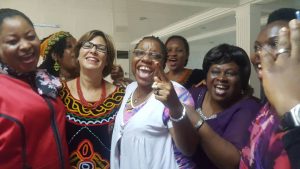
by Cynthia Petrigh | May 15, 2019 | Info, OurWork

When I arrived in Cameroon in August 2018, women, as in many African countries, were very visible at work, in the shops, in the families, keeping together a country plagued by corruption, violence, weak governance and outdated patriarchal institutions. But they were invisible from the political arena. Even at the Ministry for Women’s empowerment, my interlocutor was a man. At the UN Women where I worked, the discourse was about protecting “women and children”, pushing women in the same category as children, into one group of victims deprived of any form of agency, objects of our assistance. I felt that the objective was not to transform the outdated, patriarchal and corrupt institutions; but to please the government and seduce the donors. Merely talking about the anglophone crisis was taboo.
The causes of the anglophone crisis include discrimination, perceived lack of opportunities but also the arrogance from the Centre. The initial, non-violent claims by anglophone lawyers and teachers was met with contempt and repression. At the UN, we organised our meetings with civil society in Yaounde, not in the conflict-affected Northwest and Southwest regions. How were we to know who is doing a real job on the ground? I wanted to show respect and go and listen to the anglophone women in their turf and in their own terms. In spite of warnings from the top UN peace adviser (“You can be kicked out of the country; there’s not much to see/do in Buea anyway; if I was you I wouldn’t go”), I travelled to Buea with the support of my boss.
On my way, I stopped in Douala where I met with Cardinal Tumi, the Lead Convenor of the Anglophone conference, the only peace initiative on the table. We had a long discussion. He spoke of the upcoming Conference. I asked him: “Should only men represent the anglophone point of view?” He marked a pause. After a few minutes he admitted: “It never came up; we never thought of it”. During that initial meeting, he accepted to include women and put me in touch with Conference organiser Dr Simon Munzu. “You have great women”, was my line. “They are not coming to clap. They will have something to say. If you accept this, we will do our share; we will prepare them”. They accepted. I travelled to Buea with these good news in my pocket.
There, I met wonderful, skilful, courageous and articulate women. All women present were civil society leaders, and most of them had elected to join their efforts under a new umbrella organisation, the South West/North West Women’s Task Force -SNWOT. I was impressed by all of them, particularly the SNWOT leader Esther Njomo Omam Njomo. This was the week preceding the pre-electoral shutdown announced by the armed groups. And here, these women, most of whom were hosting IDPs and had to organise reserves for the coming days, had braved the security situation, had put aside their very real daily worries, and came to the meeting I had called for. That meant high commitment, and it also meant respect for the international institutions. Oh God! I hoped we wouldn’t fail them.
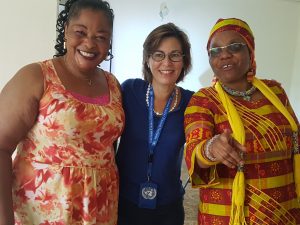
With the women in Buea on 19 September 2018.
They gave me a very good briefing on what was going on in the conflict-affected area. I realised that they were the women who can change the paradigm in Cameroon. They had the energy, the deep understanding of the crisis and the courage. When I told them that they were going to participate in the Anglophone Conference, they were thrilled. “We didn’t know we could join” they said. I was appalled to see once more that very capable women didn’t feel they were authorised to contribute. We agreed to work together to prepare their participation.
My intention (and my mission with the UN Women) was to make women count in peace and security issues in Cameroon, beyond this conference. My approach was three-pronged:
- advocate for their participation in any decision concerning the country (with the authorities, the Convenors of the anglophone conference, the diplomats in Yaounde, the UN etc). Bring to Cameroon women with high visibility like Nobel Prize winner Leymah Gbowee or negotiators from the Northern Ireland conflict, to showcase the added-value of women’s contributions.
- provide them with technical skills (on peace processes, mediation, agenda-drafting, comparative learning) so they could make more effective contributions to these fora
- give them visibility (bring them along to high level meetings, have them invited to regional or international fora)
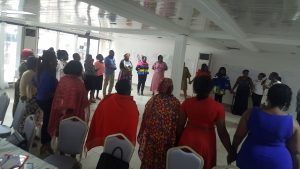
A lot of good energy and sharing during the Douala workshop in November 2018. Experts Agus Wandi and Webster Zambara joined me to co-facilitate. It was a very successful event.
This plan worked brilliantly because:
– These women were competent and dedicated and they had a true leader who helped us organise complicated events in a difficult political environment
– They had their own disagreements, but unlike most of their male counterparts who were obsessed with power and personal gains, they were happy to discuss the core issues and look for solutions to the crisis
– They just needed someone to believe in them and that was my role. My status of a consultant protected me in a way, because I could take risks
– I had by then built a solid network of contacts and many allies and friends helped me. We also benefited from a context where most donors and diplomats lacked ideas and initiatives about this crisis and we filled the vacuum. SNWOT became the only show in town. They supported us.
The Anglophone Conference was not authorised by the government. But Esther and her group did not need anymore an invitation. During a workshop I organised for them, they established a plan of action and they started running their own activities. In a very daring move, they successfully organised a press Conference in Yaounde, the Centre of power. They articulated their own agenda.
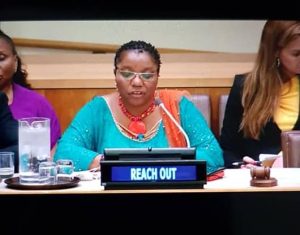
Today, 14 May, Esther Njomo the Reach Out Director and SNWOT leader gave a briefing to the UN Security Council on the humanitarian situation in the Northwest and Southwest regions of Cameroon (to watch the briefing: https://www.youtube.com/watch?v=2gkBht8pWSU)
True to her own self, she did not make it a personal victory. “I am here to talk on behalf of those women, mothers, wives, sisters, and daughters who have lost it all to the crisis. Those who are trapped in the bushes, in the forests because they lost everything they could hold onto”, she said.
At the end of her very precise and compelling speech, she launched an appeal for the cessation of hostilities and for dialogue.
“ It is time for us to silencing the guns
It is time for us to start talking”
What are the lessons from this story?
Lesson #1: If you believe in women and give them a chance, you won’t be disappointed.
Lesson #2: you only risk a career move, they are risking their lives daily. Be courageous!
Lesson #3: We need to improve the protection of women human rights defenders.
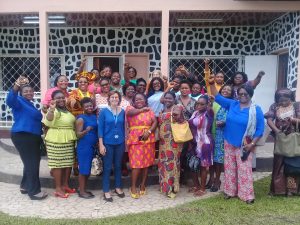
The first meeting in Buea, where it all began
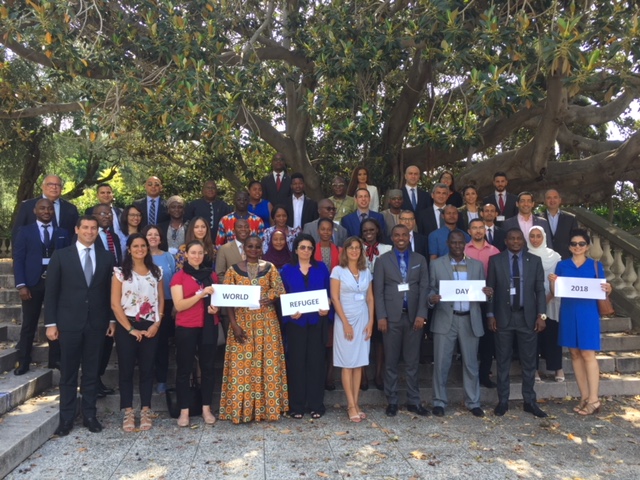
by Cynthia Petrigh | Jun 20, 2018 | OurWork
From June 19 to 23, Cynthia Petrigh from Beyond peace is directing the 94th Refugee law Course in French at the International Institute of Humanitarian Law in San remo. 45 Officials from 16 countries debate on refugee status determination procedures, cooperation among States, individual arrivals versus mass influx and security concerns for governments. The course opening featured a testimony by a cultural mediator on the Aquarius. On June 20, participants and organisers celebrated World Refugee Day while UNHCR Filipo Grandi is visiting Niger.
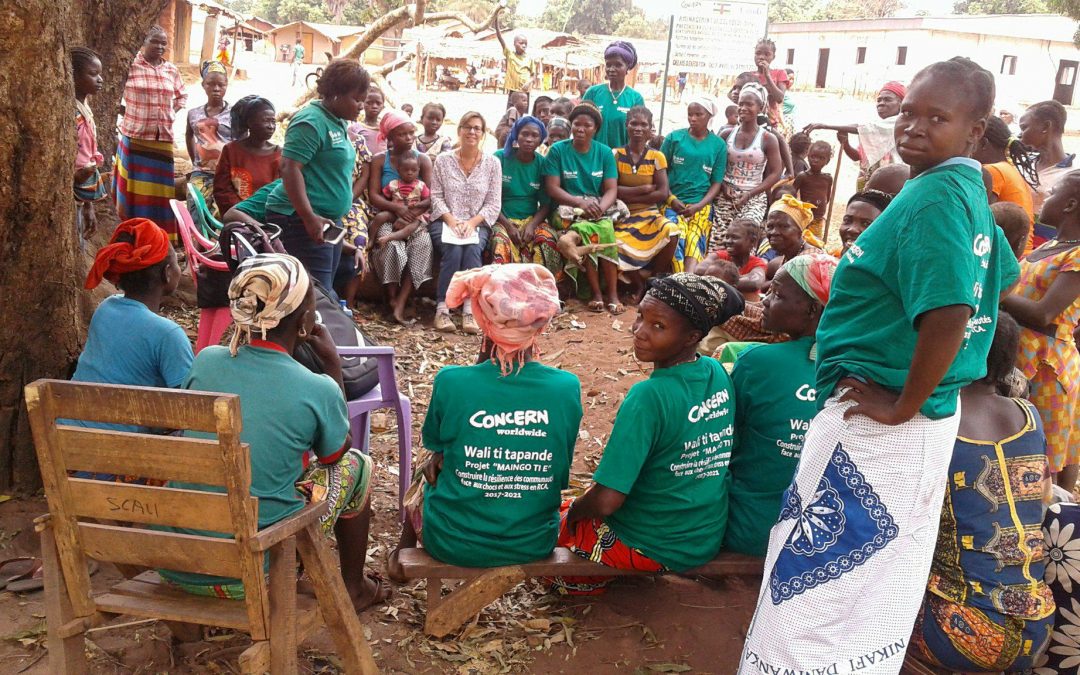
by Cynthia Petrigh | May 18, 2018 | OurWork
On behalf of NGO Concern Worldwide, Beyond peace Cynthia Petrigh and Arsène Gassi conducted a field research in 3 provinces of the Central African Republic (CAR) in february 2018, in order to better understand conflict and gender dynamics in these regions as well as how communities cope with disaster.
After surveying the 3 sous-Préfectures in Ombella M’poko and Lobaye, we ran a strategic workshop for the NGO expatriate and national staff and produced a contextual analysis, a strategy document and programmatic recommendations in view of integrating Gender, Peacebuilding and DRR.
Unsurprisingly, in the surveyed provinces as in other parts of the conflict affected country, poverty, sever gender inequalities, conflict, poor access to education as well as the inconducive mining environment were found to be hampering communities’ development. At the same time, these communities experience a relative level of calm, or negative peace. While this is mainly due to the current control by one armed group only, it can provide the space for a transformative intervention. The question of the return of the Muslims inhabitants is still pending, as are the prospects for women’s participation.
We wish Concern team full success in their 5-year programme aiming at enhancing communities resilience to disasters and conflict and fighting gender-based violence. This ambitious project complements other interventions in the region (WASH, Food for work, etc). The agency is well-placed to successfully implement this project, which could become a model for other regions in CAR.
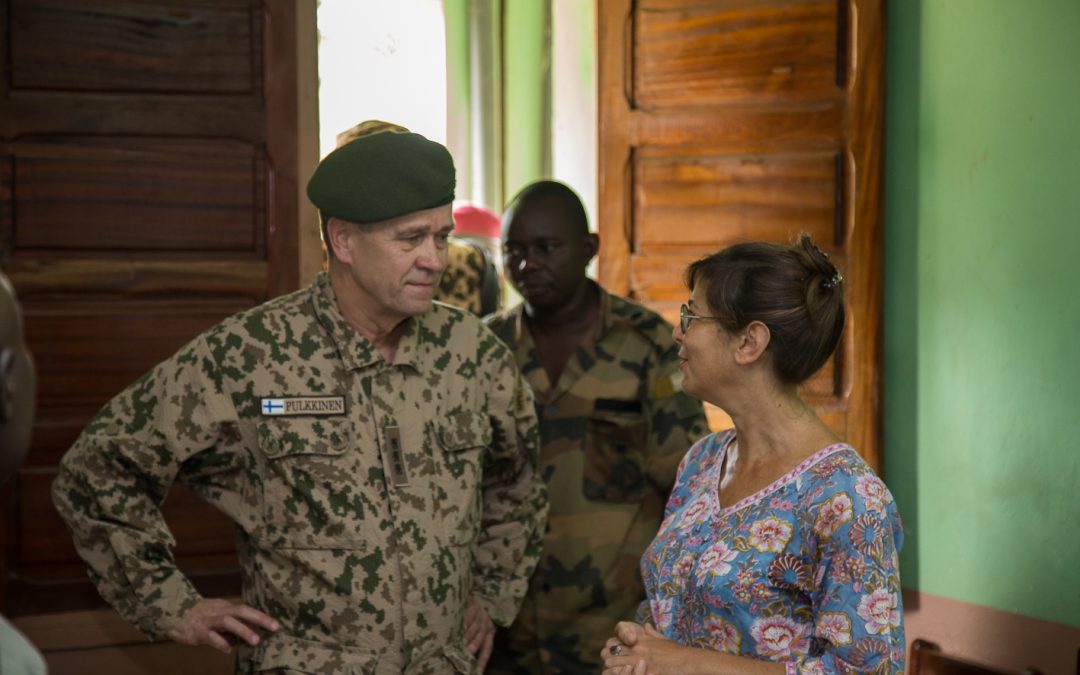
by Cynthia Petrigh | May 15, 2018 | OurWork
At beyond peace, we believe policy work is based on field experience and on lessons learnt while working with others. We see it as our role to share with the community of practitioners, and also to share findings, concerns and updates with donors and decision-makers. We are highlighting hereafter some recent events were we were able to disseminate some of our field-based evidence and reflections.
From 26-28 February 2018, we conducted in Brussels a high-level debrief to share our lessons from CAR.
After working for 6 months with the EUTM CAR on improving the FACA behaviour through training on IHL and prevention of sexual violence, we gathered a number of learnings on how EU CSDP missions could be improved. We identified that these missions lack selection standards for their staff; there was no EU pre-deployment training (training is left to nations, as is the case with peacekeepers, with the shortcomings we are familiar with); there was no gender adviser although this is an olbigation in CSDP policy; there were no women in command positions. There was no context analysis conducted, which means that the training is pretty much theoretical and not adapted to the context – with as a result a limited impact. We shared these observations with the EEAS Deputy Secretary General, with the MPCC Chief of Staff, with the NATO Ambassadors and with civil society through the European Peacebuilding Liaison Office (EPLO). We recommend that the MPCC adopts the following reforms for CSDP missions:
- include a gender dimension from the design phase, including through the deployment of a genad
- include training on IHL and PSV as a standard component of EU CSDP training missions
- prepare deploying staff through training on the context, the political and cultural dimension, the legal environment and the gender dimension
- monitor closely these aspects from Brussels level.
Our findings and recommendations will be shared in a workshop titled ‘Gender, Security and Justice in the EU Foreign and Security Policy. Tangible Transformations or Contentious Continuities?’ which will take place on the 18th and 19th of October 2018 in the National University of Ireland, Dublin, Ireland and is organised by the UCD School of Politics and International Relations.

 According to Arundhati Roy, « another world is not only possible, she is on her way. On a quiet day, I can hear her breathing. » Those who can’t hear her yet are forgiven, because there have not been many quiet days in the past couple years.
According to Arundhati Roy, « another world is not only possible, she is on her way. On a quiet day, I can hear her breathing. » Those who can’t hear her yet are forgiven, because there have not been many quiet days in the past couple years.








